Genesis
The book of beginnings
By Moses, the shepherd of God’s people
The book of Genesis establishes fundamental truths about God. Among these are His role as the Creator, His holiness, His hatred of sin, His love for mankind, and His willingness to provide for our redemption.
We learn not only where mankind has come from, but why the world is in its present form. The book also presents the establishment of Israel, God’s chosen people.
Many of the principles given in other parts of Scripture depend on the basic ideas presented here in the book of Genesis.
Within the framework of the Bible, Genesis explains the bare-bones history of the universe leading up to the captivity of Israel in Egypt, setting the stage for the book of Exodus.
Every great story has a great beginning. If Moses was speaking, He probably would say, my book of Genesis in Bible, the first book in the Bible, is no exception. It opens with a memorable phrase, “in the beginning,” a phrase that is echoed later in Scripture (John 1:1) the purpose of the book of genesis answers some basic questions:
- Where have we come from?
- Why are we here?
- What has gone so terribly wrong?
It chronicles the beginning of time, of heaven and earth, and of all God’s splendid creatures. It tells the story of a loving God who has acted to restore His broken creation to its original beauty and goodness. 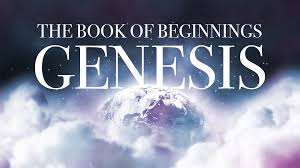
But where has this book come from? Like most things ancient, its origin is cloaked in mystery.
Tradition ascribes the authorship of this and the next four books in the Bible to Moses, a man of extraordinary ability through whom God rescued and gave laws to His people.
But even if Moses was not responsible for the final form of the book we have today, his life and work helped shape it through all the lively stories told and retold by generations that remember and celebrate his life.
Repairing, Bringing True Blessings And Healing

Genesis offers a fascinating account from the origin book of genesis creation through the age of the patriarchs: Abraham, Isaac, and Jacob.
The Scriptures reveal God as a covenant-making and covenant-keeping partner who relentlessly pursues and loves His creation.
When it becomes clear that Adam’s and Noah’s descendants have strayed from God, He chooses Abraham and his family to begin the work of repairing the world and bringing true blessing and healing to the rest of the families of the earth.
A Chosen People

As the story unfolds, the theme of the book of Genesis recounts the great exploits of Abraham, Isaac, and Jacob (whose name God changes to Israel).
At times the patriarchs flourish under God’s blessing and protection.
At other times, they fail miserably to remain faithful to what God requires of them. Despite their flaws, God is clearly at work, moving and transforming them into a people who are chosen to declare His love and truth to the world.
Temporary Freedom
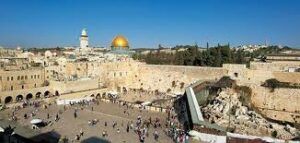
As we continue reading, closing in on a brief summary of the book of Genesis, and see the book of Genesis explained, the summary about the book of Genesis are devoted to telling the story of Joseph, one of Israel’s sons, and they relate how Abraham’s descendants come to live as free people in Pharaoh’s Egypt.
Some may find relief, finally understanding book Genesis, but when the Book of Exodus, the book after Genesis begins, it is clear their freedom has been taken away.
Genesis 1
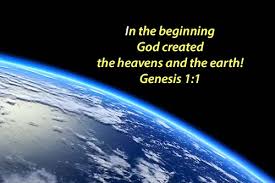
THEME:
- Creation of the universe
- Construction of the earth.
- Day one—light
- Day two—air spaces
- Day three—dry land and plant life
- Day four—sun, moon, and stars appear
- Day five—animal life
- Day six—fertility of animal life; creation of man
Genesis 1 is the first chapter of what came to be known as the Pentateuch: the first five books of the Bible. Likely written by Moses, Genesis 1 begins the story of God and His relationship with His people Israel.
The role of God as Creator is not only important for setting up His work in later chapters, but also in His supremacy and authority for all of the other words of the Scriptures.
God intends first to be known to all peoples as the Creator of all things—from sun, moon, and stars, to human life itself. And as the Creator, He is owed worship by all He has made, including and especially human beings.
Out of nowhere, time, space, and all the living whirl forth as God speaks the universe into existence. With the utterance of His voice, creation takes form, chaos yields to order, light eclipses darkness, and emptiness fills with life.
Not long after God creates the first man, Adam, and the first woman, Eve, the story takes a tragic turn when the first couple disobeys the clear instruction from God not to eat the fruit from the tree of the knowledge of good and evil.
As a result, humanity falls from God’s intended perfection. The disastrous consequences of this decisive act are demonstrated in Cain’s murder of Abel, Noah’s flood, and the Tower of Babel.
The first chapter of Genesis describes the most extraordinary event in the history of the universe: its creation. Given what this moment represents, and what we know of science and nature, this is often referred to as the greatest of all possible miracles.
The opening verses of the book of Genesis are nothing less than an account of how God, with full purpose and intention, made everything that exists.
What this account of creation tells us about God, and His role in our origins, is certainly interesting. What’s equally fascinating about these opening verses is what details they do not provide. This, of course, is the reason for the controversy often surrounding Genesis 1.
While other events in the Bible may be given many thousands of words, and minute details, the entire subject of creation is handled only briefly in Genesis chapters 1 and 2.
Even among those who hold the Bible to be authoritative, inspired, and inerrant, this leaves ample room for disagreement about how these verses are to be read in the present day.
Questions inspired by this chapter have become long-running debates. Was the universe created in six literal 24-hour days, or some longer period of time?
Is the text meant to explain a literal process, or symbolically represent the work of God?
Is this the account of the absolute beginning moments of earth’s existence or had God created something earlier, with events occurring between verses 1 and 2?
All of those questions have various answers; those answers have varied levels of support, and their own unique implications.
And yet, despite what some well-meaning believers (and non-believers) might think, most of those varied options don’t conflict with the key theological truths of Scripture.
As a result, we won’t spend a large amount of time or space discussing those specifics in this particular commentary.
The bottom line, meeting the purpose of this ministry, is that Genesis chapters 1 and 2 explicitly state several key ideas which are—for those who take the Bible to be the word of God—simply beyond debate.
While Bible-believing scholars may disagree on how God created and when God created, one thing is undeniable: Genesis chapter 1 chapter insists that God created.
In other words, no person who claims to believe the Bible is truth can also reject a belief in God as the Creator. If the Scriptures are God’s Word—and they are—then God intends to be known as the Creator of all things.
More than likely, this text was originally written by Moses under the inspiration of the Holy Spirit. Moses, thanks to his upbringing (Exodus 2:1–10), was very familiar with pagan religious views.
During the time in which Genesis was written, many cultures engaged in the worship of sun, moon, stars, seas, sea creatures, and other natural wonders.
Genesis 1 counters that culture, as well as the naturalism of our modern day, by claiming that none of those things are gods. Rather, they are merely things created by the one, true God.
He alone is worthy of worship because He alone is the Maker. In the following chapters, we will come to know Him as the God of Israel.
Genesis chapter 1 unfolds a story using repetition and rhythm. This passage was originally composed in the Hebrew language, under an often-rigid structure. These verses describe God’s decrees of creation through the context of six individual days.
Many patterns are built into the text of this opening chapter. For example, one recurrence is God preparing the world to sustain something, such as life, before creating that very thing in the same general order.
So, on day one, God creates light; on day four, He creates the sun, moon, and stars to distribute that light. On day two, God separates the waters, creating the oceans; on day five, He populates the oceans with sea creatures of every kind.
On day three, He creates dry land and fills it with vegetation; on day 6, He creates animal and human life ready to consume the fruit and plants that existed.
Genesis 1 is a rich, detailed chapter. This text is only the beginning of a fascinating, essential book for all who would know and understand God.
Readers are strongly encouraged to take their time in reading and understanding these words, and to enjoy the time spent gaining insight into the handiwork of God (Psalm 19:1).
Genesis 2
THEME:
- The Sabbath Day
- Summary of the first five days of the restoration
- Man’s creation
- Condition placed on man
- Woman’s creation
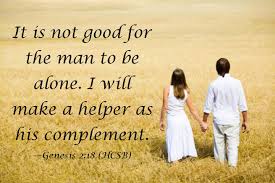
Genesis 2 concludes the description of God’s week of creation and then zooms in on the creation of man, his work, his perfect environment, and the creation of woman as his helper and wife.
It is our last glimpse of the world before it is ravaged by human sin and death with the disobedience of Adam and Eve in chapter 3. Where chapter 1 gave a full overview of creation, this chapter focuses more on a few specific events. These are crucial to understanding the fall of man.
When human body meets divine spirit, soul is born. Divine breath and sculpted earth come together to make up the living soul. For thousands of years, philosophers and theologians have posed the question: what is a human being? Here God gives the answer.
Genesis 2 begins by describing the end of God’s week of creation. Chapter 1 described what God had created day by day, for six days. The first verses of chapter 2 explain the seventh day, in which God rested from His work.
The remainder of chapter 2 focuses more details on the creation of the first man, the garden God placed him in, and the work God gave him to do. Before man was created, there were no cultivated crops, and the land was watered by streams or mists rising up from the ground.
In this passage, God creates man, forming him out of the dust of the ground and breathing the “breath of life” into him. Man becomes a living being. God places man into His newly planted garden in the region of Eden, a garden with abundant fruit-bearing trees.
Two trees in the middle of the garden stand out. They have names: The Tree of Life and the Tree of the Knowledge of Good and Evil.
For all of the debates over which aspects of Genesis are meant to be literal, and which are meant to be symbolic, the Garden of Eden is not so difficult to interpret. The writer of Genesis clearly intends it to be understood as a real place in the real world.
This portion of Scripture describes the river that runs out of it and divides into four separate rivers. Those rivers run through places that would have been especially familiar to Genesis’ first readers. They include the Tigris and Euphrates, rivers that still flow through the lands of Mesopotamia.
God places the man in the garden with specific work to do, such as maintaining the garden and naming the animals. God also issues a single, specific negative command: never eat from the Tree of the Knowledge of Good and Evil, or you will die.
This passage is also the first time when God recognizes that some aspect of His creation is not good. It’s not good for the man to be alone. There are no living things which complement Adam as the animals of the same kind correspond to each other.
So God takes a rib from Adam and makes a helper and companion for him. Eve becomes Adam’s wife. This is a fascinating action by God, one that is rich in symbolism. God obviously could have created Eve from dust, as He did Adam, but chose instead to form her out of Adam’s own body.
For this reason, the closing verses tell us, men are to separate from their parents and stick to their wives, becoming one flesh with them.
Adam and Eve’s relationship was unique in all of history. When they met, no sin yet existed in the world or between them. They remained unashamed of anything, including their own nakedness. In their innocence, they had nothing to hide from God or from each other.
In that way, they truly existed in paradise, one beyond just the plants and animals of a garden. Unfortunately, in chapter three, this ideal situation will be lost as a result of their choice to sin against God.
Genesis 3

THEME:
- The serpent denies the Word of God
- The man and woman disobey the Word of God
- The design of God for the future
- The doctrine of redemption introduced
Genesis 2 ended with the last glimpse of a sinless world. Adam and Eve are perfect in themselves, in their purpose, and in their relationship as husband and wife. Chapter 3 tells the story of that paradise lost; the result of the first willful human sin.
The consequences: immediate shame and lifelong separation from their home with God. Chapter 4 will describe the beginning of their lives together, the beginning of the painful story of human history.
Genesis provides an image of the ideal marriage: One man. One woman. In a one-flesh relationship. For life. These four elements constitute the ideal, as Jesus reminds His followers (Matthew 19:4–5).
Anything less, anything more, or anything other misses the ideal. In marriage two individuals, who once lived as “me,” come together as “we” in one flesh and one life. No earthly bond can match the intimacy of this divinely sanctioned union.
The story of humanity’s sin begins with a tree and ends on a tree: first, the tree of the knowledge of good and evil; and finally, the cross on which Jesus dies. The first tree offers fruit that leads to death, but the second offers a death that leads to eternal life.
After the triumph of the creation of the universe and all life, as described in Genesis 1—2, chapter 3 turns to the tragedy of paradise lost.
As chapter 2 ends, the first humans, Adam and Eve, are naked and unashamed, blissfully free from any experience of evil. By the end of this chapter, they will be burdened. Rebellion will bring awareness of their own capacity for sin, and their separation from the God who created them.
Their fall begins with a talking serpent. Satan seems to have either taken possession of a serpent’s body or assumed the form of a snake. He is described as the craftiest of all wild animals.
This creature approaches Eve with the single purpose of convincing her to disobey God by eating the fruit from the Tree of the Knowledge of Good and Evil.
Conversations recorded in the Bible often have the appearance of a summary, rather than a transcript. We don’t know exactly how long it took the serpent to convince Eve.
However, his masterful temptation is so effective that she seems to make her fatal choice in the space of one short conversation. First he casts doubt on what God actually did or did not command.
Then, he draws the woman into thinking about the fairness of God’s command. Then he flatly calls God a liar, questioning God’s character and motives.
Eve buys it all. The forbidden tree is beautiful, the food looks good to eat, and she believes the lie that it will make her wise. Adam quickly joins her, and the pair are immediately crushed by their shame.
This includes a sudden self-consciousness about their nudity. The “knowledge of good and evil” is achieved by the rejection of good and the embracing of evil.
So, though it is pointless to do so, Adam and Eve attempt to hide from God. God found them anyway. They confess their sin, but even then attempt to shift the blame.
God confronts the serpent and Satan, delivering to him the first of the curses resulting from the fall. Serpents would crawl on their bellies forevermore, serving as a reminder of this moment.
In addition, Satan’s existence would be characterized by his war with humanity. He would win a painful victory—bruising Christ’s heel—but would be crushed—by Christ—in the end.
The sentences pronounced for Eve, and then Adam, are heartbreaking in the way they continue to reflect our everyday human experiences. Women would suffer pain, both in bearing and birthing children and in ongoing conflict with her husband.
Men would face pain and frustration in his work, struggling to make the cursed ground yield food until he finally died and returned to the ground himself.
Despite their disobedience and sin, God still provides for mankind. This begins with clothes made from the skin of an animal, the first sacrifice of life for a covering. But Adam and Eve cannot stay in the Garden of Eden.
It is no longer for them. For one thing, God would not allow them to eat of the Tree of Life and gain physical immortality in their state of spiritual death and sin. To be trapped in a perpetual state of death and separation would be truly cruel.
God banishes mankind from the garden and assigns an angel to guard the way to the Tree of Life. With that, the painful story of fallen human history begins.
Genesis 4
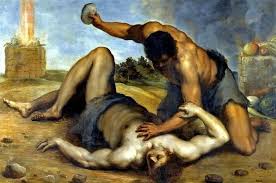
THEME:
- The birth of Cain and Abel
- God gives Cain a second chance
- Cain murders Abel
- The children of Cain and a godless civilization
- The birth of Seth
The first three chapters of Genesis explain the creation and loss of paradise, as Adam and Eve are separated from God both physically and spiritually. Their relationship with Him does not end, however. Eve recognizes His help in bearing her son Cain and later Seth.
Cain and Abel both worship God until Cain kills Abel. God provides protection for Cain, whose descendants become innovative, artful, arrogant, and violent.
The descendants of Seth, however, begin to call on the Lord’s name. This chapter bridges the story of Genesis from our ultimate origins to the story of Noah, introduced in the next chapter.
One of the first things Adam and Eve do after being banished from the garden of Eden is to make a baby. Despite the pain of childbirth, Eve speaks with joy of the birth of her son.
She certainly suffers and could have easily died in childbirth, but the desire to reproduce and the joy of joining with God in the creative process brings great reward. Every parent knows the risks and rewards of bringing forth the next generation.
Even as God continues to provide for the first few generations of humans, the consequences of human sin and spiritual separation from God become obvious. Adam and Eve start having children, including Cain and his brother Abel.
Eve knew she was directly responsible for the pain she experienced in childbirth (Genesis 3:16), but she still gives God credit for helping her to bear Cain.
Cain and Abel grow up and choose different professions, both apparently maintaining a relationship with God. When both bring offerings to God, He shows favor on Abel and his offering of the fat of one of his slaughtered lambs.
God does not, however, show favor on Cain or his offering of the fruit of the crops from the fields he has been working. This might have been due to a poor attitude on the part of Cain.
Or, Cain’s offering might have been smaller or less sacrificial than it ought to have been. For whatever reason, God does not find his efforts pleasing.
Cain becomes angry, and envious of his brother Abel. God warns Cain that sin is crouching at the door and Cain must master it. If sin and temptation are allowed to be in control, tragedy is soon to follow.
Instead, Cain meets Abel in a field and murders him. This first recorded human death, and murder, once again sees God confronting His own creation over their sin. He comes to Cain and says that He can hear Abel’s blood crying to Him from the ground.
In a scene similar to God’s curses on Adam and Eve after their sin in the garden, God punishes Cain by cursing him from the ground. It will never again give him crops. God also sends Cain away from his family to wander the earth.
Cain complains that without God’s protection someone will surely kill him in retribution of Abel’s murder. So, God marks Cain somehow for his own protection and promises to avenge seven-fold anyone who kills him.
Cain wanders to the land of Nod (which means “wander”). He marries, helps to build his city, and has a son, who has a son, who has a son. Lamech, Cain’s descendent who was seven generations from Adam, seems to share Cain’s rebellion, arrogance, and violence.
Adam and Eve have another son, though. Eve sees Seth as God’s replacement for lost Abel. Seth and his line become known as people who rely on God and call upon His name.
Genesis 5
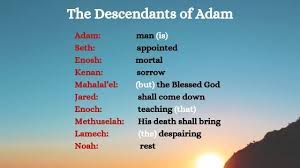
THEME:
- Final chapter of Adam’s biography
- The thrilling story of Enoch
- The genealogy of Enoch to Noah
Genesis 4 ends with the birth of Seth’s son Enosh, and a statement that people had begun to call on the Lord’s name.
Chapter 5 details the generations from Adam through Seth to Noah, connecting the time of Adam and Seth with the time of Noah and his sons as described in chapter 6. This sets the stage for God’s judgment of mankind’s pervasive sin in the flood.
In the first section of the Book of Genesis (chapters 1–11), we have world events—first the Creation, then the Fall, and now the Flood in chapters 5–9. In chapter 5 we have the book of the generations of Adam through Seth. Cain’s line has been given to us and is now dropped. It will be mentioned again only as it crosses the godly line. This is a pattern that will be set in the Book of Genesis.
In one sense, chapter 5 is one of the most discouraging and despondent chapters in the Bible. The reason is simply that it is like walking through a cemetery. God said to Adam, “. . . For in the in Adam all die . . .” (1 Cor. 15:22).
This is the book of the generations of Adam. Chapter 5 serves to link the history of creation and the earliest of the humans with the time of Noah and the flood. It accomplishes this with a simple genealogy of Adam’s descendants through his son Seth.
The chapter begins by restating an essential truth about God’s creation of humankind. He made men and women in His own likeness and used the name ā’dām, which is literally the Hebrew word for “human.”
This likeness isn’t about a physical resemblance to God. It’s about God giving His image to humans as His representatives on earth. It’s about sharing with humanity His responsibility to rule and subdue the rest of creation.
Being made in God’s likeness also means that each human life has great value in God’s eyes.
This likeness to God is passed down from one generation to the next in the same way that a father’s likeness is passed down to his son. So as Adam fathers Seth and Seth fathers Enosh, the likeness of God and man are handed down through the years together.
Chapter 5 also reveals key details about the lives of people after the garden, spiritually and physically separated from God and under His curse. First, the lifespans (and reproductive years) of the earliest humans were extraordinarily long.
The text gives explicit clues as to whether or not the numbers reported are actual years. However, it is difficult to square a non-literal interpretation with the figures given.
Such lengthy lifespans would have been entirely possible on an earth free from pollution and genetic decay. This would have allowed for the earth to be populated very quickly.
Second, we see that though there is great progress—as mortal eyes see it, humanity thrives in this chapter—the curse remained as an oppressive reality in the lives of men.
Chapter 4 detailed the lives of Cain’s descendants, some of whom exhibited even more aggression than Cain did (Genesis 4:23–24). In contrast, Noah’s father, Lamech, declares that Noah will provide comfort or rest for him in the painful work of pulling his livelihood out of the ground.
Finally, no matter how long these first generations of humans lived, one theme is constant in their lives: They die. This ultimate consequence of sin becomes the norm.
Enoch, commended for walking with God, becomes the exception that proves this rule (Genesis 5:24). His case becomes unique in all of history.
The long lives of these patriarchs also highlight another crucial aspect of the fall of man. According to the numbers given in this chapter, Adam and Seth are both still alive when Lamech, Noah’s father, is born.
Methuselah, who dies in the same year as the flood, lived more than 200 years before Adam passed away. The sin and depravity humanity falls into, as chapter 6 describes, is not something which can be blamed on ignorance.
Right up to the moment of the flood, humanity had access to men and women who were first-hand eyewitnesses of God’s power and providence. Our decay was not due to simple error, but willful disobedience.
The chapter ends with the birth of Noah’s sons, preparing us for the story of God’s righteous judgment of human sin through the flood.
Genesis 6
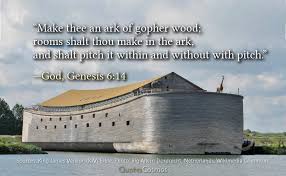
THEME:
- Cause of the Flood
- God’s deliverance from the judgment of the Flood
- Instructions to Noah for building the ark
- Passengers in the ark
The previous chapter traced the generations from Adam through his son Seth and all of the way to Noah. This chapter reveals that Noah will be the man through whom God will preserve humanity for a new beginning after wiping out all life on the face of the earth.
God tells Noah to build an enormous structure, an ark, and prepare to welcome representatives of all of the animals on earth. Noah does exactly that, setting the stage for the cataclysmic judgment of God to come in chapter 7.
Throughout Scripture God is described as spirit and humans as flesh. God’s statement emphasizes the eternal, life-giving nature of spirit and the mortal, dependent nature of flesh.
Without God’s Spirit-breath sustaining humanity, life itself is not possible. Humans are totally dependent on God. The upper limit of human life is set at roughly 120 years; but the change comes gradually, and Aaron is the last of the patriarchs to live beyond the limit.
Just a few chapters ago, God looked at all He had made on the earth and called it good (Genesis 1:31). Several hundred years after Adam and Eve walked out of Eden, God sees a very different world.
Human sinfulness has made it far from good. This trend towards sin is certainly not out of forgetfulness. Adam and his children all live hundreds of years, maintaining a long line of eyewitnesses to God’s work on earth. And yet, many terrible things begin to happen in the world of man.
For one thing, the members of a mysterious group described as the “sons of God” begin to take human wives and reproduce. Their offspring became heroic and famous and, apparently, quite powerful on the earth.
There is frequent debate over the nature of these men. Some speculate that they were humans of large physical build. Others suggest these were the offspring of humans and demons. Or that they were aliens.
While the number of possible interpretations is almost infinite, the Bible devotes very little time to this particular idea. Rather, it seems to be a footnote in the story of the flood.
Powerful humans unchecked in their sinfulness always produce death, destruction, and wickedness. Consider how much damage modern dictators have done with only 30-40 years of active life at their disposal.
In this chapter, God points out that every inclination of the thoughts of human beings is only evil all the time (Genesis 6:5). He decides to reduce human lifespans to just 120 years (Genesis 6:3).
Much as with confusing languages at the Tower of Babel (Genesis 11), this seems to be God’s way of limiting the evil man can inflict.
An alternate interpretation of this passage is that God will wipe out all land-dwelling life on the planet in 120 years. However one interprets this remark, it certainly comes to pass.
Very few times in Scripture is God said to experience “regret.” The state of mankind prior to the flood produces this emotion in their Creator. This comment has to be understood in careful context, and with a sense of the original Hebrew language.
What God experiences here is not a feeling of error, but a sense of anguish. Much like a parent who feels pained when disciplining a child, but has no doubt that it is the right decision, so too can God feel grief over man’s sin without concluding that He was wrong to create humans.
Some translations use phrases such as “grieved,” or even “repented,” all carrying the same idea of sorrow (Genesis 6:6–7).
However, the Bible does not indicate that God feels guilt, or doubts about His creation. Rather, this verse expresses God’s anguish at seeing the wickedness and violence in the world of men.
In order to preserve His creation, God declares that He will exercise His authority as the Creator and wipe out humanity for its sinfulness and violence, along with the birds, insects, and other animals (Genesis 6:7, 13, 17).
In this chapter, as with those that follow, there is often debate over the extent of this flood. Some see this as a truly global event, others as a “local” event which only destroyed all of man, not all of the planet.
There are points to be made on both sides, but God’s intent—and the effect—is beyond debate: the destruction of the entire human race, with exception of one family.
That exception is Noah. God points out that Noah is a righteous and blameless man who walks faithfully with the Creator. God declares His intentions to Noah: He will destroy all land-dwelling life with a great flood.
However, He will not wipe out His creation entirely. He will spare Noah and Noah’s family. In addition, He will spare a male and female pair of every kind of bird, “creeping thing,” and animal (Genesis 6:19–21).
The means for this salvation are unique. God tells Noah to build a huge box, an “ark.” It will be some 450 feet (137 meters) long, almost 5 stories tall, and seaworthy (Genesis 6:14–16).
Once it is constructed, Noah and family will board the ark and be saved from the coming flood. In addition, Noah will prepare food for his family and all the pairs of animals who will come to ark, at God’s direction, to be saved.
The chapter ends with an amazing statement: Noah did everything, just as God commanded. Faithful Noah would be saved and be the means by which God would save humanity and start again.
And, the story of the ark and flood will serve as powerful foreshadowing of the ministry of Jesus Christ, many thousands of years later.
Genesis 7
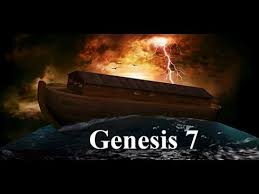
THEME:
- Noah, his family, and the animals enter the ark
- Destruction of all flesh and the salvation of those in the ark
In chapter 6, God saw the wickedness and violence of humanity and resolved to wipe it all out. He revealed that plan to Noah, and He commanded Noah to build the ark.
In chapter 7, the ark is finished, the animals arrive, the door is shut, and the rain begins on a specific date in the history of the world. All life aboard the ark is saved; all land-dwelling, air-breathing life outside of it is ended.
The waters burst from below the earth and pour from above with great intensity for 40 days and then covered the earth for another 110. In the following chapter, the ark will come to rest, and the remade earth will begin to dry out.
In distinguishing between animals that are ritually acceptable and unacceptable, God is anticipating the instructions He will give His people later regarding holiness and purity (Leviticus 11:1–47; Deuteronomy 14:4–20).
Some animals are ritually acceptable for sacrifices, so they are suitable for food. Other animals are not to be offered to God or eaten. Ultimately, what enters human bodies matters to God; after all He made them.
Genesis 8
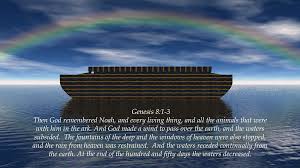
THEME:
- The rains cease
- Earth dries—Noah leaves the ark
- Noah builds an altar and offers sacrifice
Genesis 6 and 7 explain the events leading up to the flood, and the actual catastrophe itself. After the devastation and destruction are over, God begins to dry out the earth in Genesis 8.
The waters recede, Noah and the animals finally leave after a year aboard, and Noah offers animal sacrifices in worship to God. God commits to never again strike down all life on earth at once.
As long as the earth remains, living things will enjoy the cycles of day, night, and seasons. The following chapters describe the re-population of earth by mankind, leading up to another instance of God’s intervention, at the Tower of Babel (Genesis 11).
We are given the record not only of the building up of the Flood but also of the prevailing and now the assuaging of the Flood. We are told that “God remembered Noah”—how lovely—and that “God made a wind to pass over the earth, and the waters assuaged.”
It did not happen just overnight. The buildup of the waters took over 150 days, and then there were 261 days in the assuaging. That looks to me like it is something more than just a local flood.
Genesis 9

THEME:
- New instructions and arrangements
- The sin of Noah and his sons
Chapters 6, 7, and 8 describe God’s destruction of the world in a massive flood. Now, in Genesis 9, Scripture describes God’s dealings with Noah and his sons following the flood. First, God blesses them and gives specific instructions, including the command to fill the earth.
Next, God expands on His promise to never again end all life on earth a flood.
Finally, Noah curses Ham and blesses Shem and Japheth after Ham tells his brothers about seeing Noah passed out drunk and naked. Chapters 10 and 11 will sketch out the history of mankind from Noah to Abraham.
All life is sacred. Human life is especially so. Protecting it is of utmost importance to God. He takes this so seriously and personally because He made humanity to reflect Him.
We are His earthly representatives, made in His image. To murder another person is to mount an attack on the One who created him.
Noah’s words are not idle words. As the story unfolds, the importance of this curse becomes clear. But as the ancients knew, and we now have forgotten, words have power.
It was with a word that God created the heavens above and the earth below. Now Noah’s words create a new reality, a harsh reality for Ham and his children.
Genesis 10
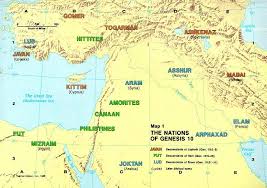
THEME:
- Sons of Japheth
- Sons of Ham
- Sons of Shem
Genesis 9 described events that happened between God, Noah, and his three sons after the flood.
Genesis 11 will tell the story of the Tower of Babel and the dispersal of the nations. Between them, Genesis 10 is a table of the nations that come from Japheth, Ham, and Shem after God divides and disperses humanity.
This is a chapter of genealogies, of families, which are the origin of the nations of the world. This chapter is far more important than the space I’m giving to it would indicate.
If you are interested in ethnology and anthropology and the story of mankind on the earth, you may want a far deeper study than you will find here.
H. S. Miller, who has his master’s degree in ethnology, has charted the origin of the nations, using Genesis 10 as a basis for the threefold division of the human family, which is revealed in these three sons of Noah: Ham, Shem, and Japheth. Ethnology makes it evident, by the way, that neither the sons of Japheth nor the sons of Noah.
Genesis 11
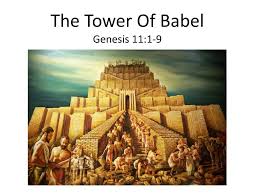
THEME:
- The building of the Tower of Babel
- From Shem to Abraham
Genesis 10 provided a table of the nations, describing the peoples and tribes that descended from Noah’s three sons and where they settled.
Genesis 11 describes how God scattered the peoples of the world after confusing their languages to stop the building of Babel and its tower.
The chapter also provides a direct genealogy from Noah to Abram and then introduces Abram by way of his father Terah. The following chapter will begin the story of Abram and God’s chosen people, Israel.
The desire to settle in one place and build a city runs counter to God’s command to spread out across the earth. They want to make their mark on the world rather than conform to God’s plan for their lives.
They want power and prestige. They want to ensure that they will not be scattered; that is, they want to choose their own destiny. But God has a different plan and purpose. He is the One who determines destiny.
Genesis 12
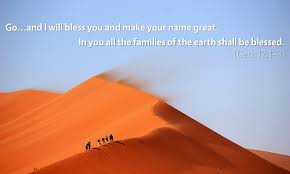
THEME:
- God’s call and promise to Abraham
- Abraham’s response
- Abraham’s lapse of faith
The end of Genesis 11 tells the story of Terah, Abram’s father, and the family’s journey to a new home in Haran. Genesis 12 shifts the story to Abram and his journey on into the land of Canaan.
God promises to make Abram the father of a great nation, and to give Abram’s descendants that very land. Abram begins to worship the Lord, but quickly fails a test of his faith in Egypt. God shows Himself faithful in a miraculous way, preparing Abram for what’s to come in chapter 13.
Out of all the descendants of Noah, God chooses Abram to have a special relationship with Him. He calls Abram to enter into a particular kind of relationship that changes the course of his life and the lives of his people forever.
God has a plan to rescue the world from sin and destruction, and that plan begins with one man. He promises to make Abram a great nation, to bless and protect him, and ultimately to bring true and lasting blessing to the world through his children.
To enter into that promise, Abram must do something daring; he must leave everything he knows and put his trust in God.
Sarai is an unusually attractive woman. Even at her age of 65, Abram is afraid of what the Egyptian men might do when they see her and desire her.
So he takes matters into his own hands and devises a half-truth to conceal their marriage.
We learn later — when Abram repeats this half-truth to Abimelech (chapter 20) — that Sarai and Abram have the same father but a different mother.
Genesis 13
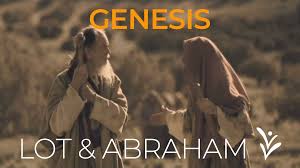
THEME:
- Abraham separates from Lot
- Lot goes to Sodom
- God appears to Abraham and reaffirms His promise
Genesis 12 ended with Abram and his large company being kicked out of Egypt by an angry Pharaoh. Back in Canaan, Abram and his nephew Lot are forced to split up due to the large size of their herds.
Lot’s choice to live near the wicked city of Sodom will have grave implications in coming chapters. God reaffirms and expands on His promises to Abram, who settles near Hebron, building another altar to the Lord and worshiping God there.
Abram is an exemplary man of faith. Being older than Lot, he by custom has first choice of the property, but he waives his right and grants Lot the first choice.
Given their recent experiences in the famine, it is no wonder that Lot chooses the lush, fertile soils of the Jordan Valley for his new home. But as Lot moves his family east, he moves farther from Abram and closer to danger.
Genesis 14
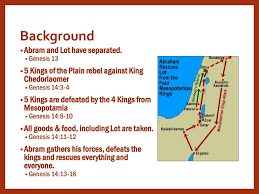
THEME:
- Kings of the east capture Sodom and Gomorrah
- Abraham delivers Lot
- Abraham refuses booty
At first, Genesis 14 seems unrelated to the previous chapter.
Four kings from the east come to wage war against the kings and people groups of Canaan, including five kings from cities around the Dead Sea. The eastern kings defeat all challengers, looting Sodom and carrying off Lot and his entire family.
Now Abram reappears in the story to chase down the departing army, defeat them in a single night, and retrieve all that was lost. On the way home, he is met by a mysterious king and priest of God Most High known as Melchizedek.
This unusual encounter has sparked much interest over the centuries. Melchizedek, it seems, appears out of nowhere.
There is no genealogical record for him; he is described simply as the priest-king of Salem, likely a reference to the city that will one day be known as Jerusalem.
The Hebrew root of the name Salem means “peace” (shalom). Melchizedek comes in peace, offering the victors a meal to sustain them on their journey home. Abram, in return, gives Melchizedek ten percent of the spoils claimed in battle.
There are two other scriptural references to Melchizedek in Psalm 110 and Hebrews 7. The writer of Hebrews compares the priestly role of Jesus to the ancient priestly order of Melchizedek showing that Jesus’ role, like that of Melchizedek, is superior in every way to the later Levitical priests.
Genesis 15
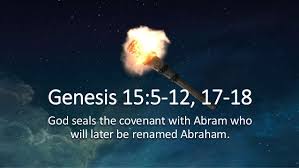
THEME:
- God’s revelation of Himself as shield and reward
- Abraham’s faith
- God’s covenant with Abraham
Where Genesis 14 was an action-packed story of war and rescue, Genesis 15 consists of a single conversational encounter between the Lord and Abram. This concludes with the formalizing of God’s covenant promises to Abram in a dramatic covenant ritual.
Abram respectfully asks the Lord some hard questions about how the seemingly impossible promises might be kept. God responds and Abram believes.
In addition, God reveals to Abram a prophecy about the difficult future his descendants will face as servants in another country before returning to take possession of the land of Canaan.
This now is the fourth time that God has appeared to Abram. God is developing this man and bringing him farther along. God does well to appear to him now because Abram has taken a tremendous step of faith in going out and rescuing Lot and in turning down the booty which the king of Sodom offered him.
Genesis 16
THEME:
- Sarai’s suggestion
- Hagar flees
- The tests of Abraham
After formally establishing His covenant promises with Abram in the previous chapter, the Lord still has not given Abram and Sarai a child. Sarai convinces Abram to take her slave girl as a wife in hopes of getting a child that way. Abram agrees. Pregnancy and conflict soon follow.
Sarai treats Hagar so harshly that the girl runs off alone into the wilderness. The Lord finds her and commands her to return and submit. He also reveals, however, that Hagar’s child Ishmael will become the father of a great people who will live in conflict with everyone.
As we come to this chapter, I must confess that I almost wish it were not in the Bible. After Abram rose to the heights in chapter 15, you would say that he certainly is treading on high places—but he is not perfect.
In chapter 16 we see the lapse of this man’s faith relative to Sarai and Hagar, the Egyptian maid. We have here the unbelief of both Sarai and Abram, and the birth of Ishmael.
This is certainly a letdown after the wonder of the previous chapter.
Genesis 17
THEME:
- God gives Abraham a new name
- God’s covenant
- Ishmael’s inheritance
Genesis 17 records the details of God’s appearance to Abram, now 99. Thirteen years after the birth of Ishmael to Sarah’s servant Hagar, God arrives to change Abram’s name to Abraham, to confirm the covenant promises, and to command Abraham.
He is to circumcise every male in his household as a sign of the covenant. Then the big news: within a year, Abraham’s wife—now renamed Sarah—would bear Abraham a son. This long-awaited son would be the one through whom God would keep all of His promises to Abraham.
The Scriptures tell us that names matter. What we call people and places often describes and defines them in ways other kinds of words do not.
People’s names may recall the circumstances of their birth or reflect their character or perhaps depict their destiny.
God changes Abram’s name to Abraham to signify that he will become the founding father of many nations.
The change in Sarah’s name is a bit more complicated because both “Sarai” and “Sarah” mean “princess.” Still the name “Sarah” becomes her covenant-name, the name by which generations know her.
As the wife of Abraham’s youth and old age, Sarah is destined to become the founding princess of many nations, a royal mother to many kings.
Genesis 18
THEME:
- God reaffirms His promise
- God announces the coming destruction of Sodom and Gomorrah
God appeared to Abraham in the previous chapter revealing, in part, that Sarah would bear Abraham a son within a year’s time. Now the Lord appears again, this time in human form and accompanied by two disguised angels.
He reveals to Sarah the same promise. She laughs, and the Lord insists that even her age isn’t too hard for Him to overcome. Next the Lord reveals to Abraham that He will investigate the sins of Sodom and Gomorrah.
Abraham receives the Lord’s promise not to destroy Sodom (where Abraham’s nephew lives) if He finds 10 righteous people in the city. Unfortunately, the city is beyond saving, and the next chapter details its utter destruction.
Scripture records an amazing exchange between the Lord and Abraham. In all of the Bible there is nothing quite like it.
In these verses Abraham is negotiating with God over the fate of Sodom and its inhabitants.
But this is no game. Abraham isn’t bargaining with a peddler over the cost of his wares; the lives of many people hang in the balance.
Abraham has followed God long enough and knows Him well enough to stand confident as he presses and probes the extent of God’s mercy.
God’s mercy, he learns, runs deep; but there are limits, and Sodom has crossed the line.
Genesis 19
THEME:
- The angels visit Lot
- Destruction of the Cities of the Plain
In the previous chapter, Abraham had bargained with God on behalf of his nephew Lot and the people of Sodom. The Lord assured Abraham He would not destroy the cities if He found ten righteous people there.
Chapter 19 immediately demonstrates no righteous people are to be found. Every man of Sodom attempts to attack two visitors, who are God’s angels in human form. As the angels rescue Lot, God’s judgment falls, utterly destroying everything in the area around Sodom and Gomorrah.
Lot and his daughters end up in a cave in the hills, where the daughters scheme to conceive children by making their father drunk. This ends Lot’s role in the story of Genesis, with future chapters focusing exclusively on the life and descendants of Abraham.
Lot leaves the safety of his home to negotiate with the men of the city, all of whom seem determined to have sex with his guests.
Although his courage is commendable, his solution is deplorable — offering his virgin daughters for the deviant pleasures of his neighbors.
But Lot knows their sexual preference is for his guests, not his daughters; so the offer is safe, and he has bought some time.
Lot’s wife makes a fateful turn. She stops and looks back. No one knows why.
Perhaps it is to mourn the past.
Perhaps curiosity gets the better of her; but instead of looking ahead to her destination — a place of safety and security — she turns around and looks back at what she has left behind.
In that instant, as the messenger warned, she perishes. All that is left of her is a standing pillar of salt.
Genesis 20
THEME:
- Abraham misrepresents Sarah
After the dramatic events of the previous chapters, Abraham moves south of Gaza to Gerar. As he did in Egypt, he claims that his wife is his sister.
The king of Gerar, Abimelech, takes Sarah as his wife, but is soon struck ill and never approaches her. The Lord offers to spare Abimelech and his household if he will return Sarah and if Abraham will pray for them. Sarah is returned.
All are healed, including all the women who have been unable to bear children. In the following chapter, Sarah herself will finally bear Abraham a son—an outcome God safeguards through His actions in this chapter.
Scripture is brutally honest when it comes to people. It never sugarcoats the depths of human degeneracy.
Here is a prime example:
Lot’s daughters conspire to commit incest with him, an act so reprehensible it is universally condemned.
They do so in order to guarantee their future and security, but as a result they create a future where insecurity and trouble are guaranteed.
The nations which they birth become two of the most troublesome enemy nations God’s people will ever have to deal with. As time goes on, the Moabites and Ammonites become fierce adversaries to the children of Abraham.
Genesis 21
THEME:
- The birth of Isaac
- Hagar and Ishmael cast out
- Abraham and Abimelech at Beer-sheba
In the prior chapter, Abraham managed to get Sarah back from Abimelech, following his own deception and God’s intervention.
Here, Abraham and Sarah finally conceive a natural child. Isaac, the long-awaited child of the promise, is born.
In obedience to God, Abraham sends Hagar and Ishmael away. Abimelech approaches Abraham to make a treaty, giving Abraham a permanent home in a place that becomes known as Beersheba.
In the following chapter, God will test Abraham’s faith and obedience, in one of Scripture’s ultimate examples of trust.
Once again Abraham and Sarah take matters into their own hands.
Although God has promised to protect and prosper them, they choose half-truths and deception in order to stay in Abimelech’s favor.
The results could have been disastrous; but God’s intervention stops Abimelech from violating Sarah’s marriage, and in the end obedience preserves them all.
Abraham, it seems, is rewarded, not because of his deception but in spite of it. Since Abimelech does the right thing, God brings hope and healing to his family as well.
Does good then result from evil? Not at all. The good comes from God’s action and everyone’s eventual obedience.
What is clear through these narratives is that God has a plan, and He can manage any contingency in achieving His purpose. When God is on the move, even evil can be turned into good.
Genesis 22
THEME:
- God commands Abraham to offer Isaac
- God restrains Abraham
- God reaffirms His promises
- Abraham returns to Beer-sheba
In the previous chapter, the long-promised Isaac was finally born to Sarah and Abraham, while Abraham’s other beloved son, Ishmael, was sent away to be cared for by God apart from them.
Now God tests Abraham’s faith and obedience by commanding him to offer his precious son Isaac as a burnt offering. Abraham sets out to obey without hesitation, stopping only when the Lord cries out to him.
For Abraham’s obedience, God renews and emphasizes the blessing on him and his offspring. This marks the beginning of the end of Abraham’s story, as the book of Genesis transitions to focus on Isaac and his descendants.
Abraham leaves Beersheba as he left Haran many years earlier. God calls and he leaves. It is as simple as that. No map. No directions. Just an unwavering trust that God will lead him where he needs to go.
Mount Moriah becomes one of the most important places in all of the promised land, the one place in the world set apart for the worship of the one True God.
According to 2 Chronicles 3:1, Solomon builds his temple on Mount Moriah in Jerusalem, not far from where God tests Abraham.
We reach the climax of Abraham’s covenant story. God tests Abraham, and he passes with flying colors. Somehow he knows God will provide, for he tells his servants that he and his son will come back from the mountain.
He also knows that God’s covenant promises are going to be fulfilled through Isaac and not another. Although Abraham is willing to sacrifice him, he expects Isaac to still be the one through whom God’s blessings come to the world.
How could it all happen? Only God knows, and Abraham trusts in God and His promises. Abraham’s level of trust is unmatched in all of Scripture. This is why he stands as the founding father of our faith.
Genesis 23
THEME:
- Death and burial of Sarah
In the previous chapters, Isaac was born, Ishmael was sent away, and Abraham prepared to offer Isaac as an offering to God.
Genesis 23 jumps forward a couple of decades to the death of Sarah at 127 years old. Abraham mourns for her and then purchases a cave near Mamre as a permanent family burial place in the land of Canaan. In the following chapter, Abraham will set about finding Isaac a wife.
This account reveals the complex and rather ambiguous Near Eastern way of negotiating a purchase is as follows:
The transaction takes place publicly at the city gate in the presence of the community leaders who could serve as advisors to the deal or witnesses if the deal goes awry.
Initially Ephron offers to give the land to Abraham for a burial site, but in true Near Eastern style the patriarch indicates respectfully that he desires to purchase it instead.
Ephron’s true motive may be seen in his counteroffer; the property is worth 10 pounds of silver, a not-so-insignificant price for a tract of land on the edge of his property.
Abraham’s motive is clear enough. He wants to own outright a parcel of land near where he and his family have lived for many years, a land promised to him by God, a land where now Sarah has died and needs a proper burial.
Gifts come with strings attached, and Abraham does not want to owe Ephron or anyone else for that matter. He knows full well he owes everything to God.
Genesis 24
THEME:
- A bride for Isaac
We have come in chapter 24 to a major break in this second division of Genesis.
- The first division (chapters 1—11) deals with four great events.
- The second and final division (chapters 12—50), deals with four outstanding individuals.
Specifically, in Genesis 12—23 we have Abraham, the man of faith. Now in chapters 24—26 we have Isaac, the beloved son.
There are three great events in the life of Isaac, and we have already seen two of them.
- The first was his birth,
- and the second was his being offered by Abraham.
- The third is the obtaining of his bride.
Genesis 24 takes place a few years after Sarah has died. Abraham becomes urgent to find Isaac a wife, not among the women of Canaan, but from his own people back in Mesopotamia.
His trusted servant, sent to accomplish this mission with the help of the Lord, eventually returns with Rebekah, the granddaughter of Abraham’s own brother. Isaac is married to her at the age of 40. Abraham’s death is recorded in the following chapter.
They say there are three great events in a man’s life—his birth, his marriage, and his death—and that he has no choice except with the second one, marriage.
Sometimes a man doesn’t seem to have much choice in that connection either, but, nevertheless, these are the three great events in a man’s life.
We come now to the story of how Isaac secured his bride. Abraham sends his trusted servant back to the land of Haran in Mesopotamia to get a bride for Isaac—and we will see the success of the servant in securing Rebekah.
This is a very wonderful love story. It reveals that God is interested in the man whom you marry, young lady, and He is interested in the young lady whom you marry, young man.
There are two institutions that God has given to the human family: one is marriage, and the other is human government (God permits man to rule himself today).
These are two universal and very important institutions. When these are broken, a society will fall apart. The home is the backbone of any society—God knew that—and He established marriage, intending that it give strength and stability to society.
The same thing is true relative to human government—a government must have the power to take human life in order to protect human life—that is the purpose of it. Because human life is sacred, God gave such laws.
The point here is that God is interested in your love story, and it is wonderful when you bring God into it. The first miracle that our Lord performed was at a wedding in Cana of Galilee. I do not know how many weddings He went to, but He went to that one.
The twenty-fourth chapter of Genesis is one of the richest sections of the Word of God because it tells a love story that goes way back to the very beginning.
A very dramatic account is given here of the way that a bride was secured for Isaac, and again, a fantastic spiritual picture is also presented to us.
There are two things that I want you to notice as we go through this chapter.
One is the leading of the Lord in all the details of the lives of those involved. It is a remarkable statement that is made, time and time again, of how God led.
Even in this early day, there were those in that social climate who were looking to God and following Him as an uncivilized people.
Don’t believe a word of it!
Here is a record that shows that man did not start out as that kind of man at all—and we find here the leading of God.
If God could lead in the lives of these folk, He can lead in your life and my life.
The second thing to notice in this chapter is the straightforward manner in which Rebekah made her decision to go with the servant and become the bride of Isaac. This is a tremendous thing which we will notice as we go through.
Genesis 25
THEME:
- Abraham marries Keturah
- Abraham dies
- Esau and Jacob
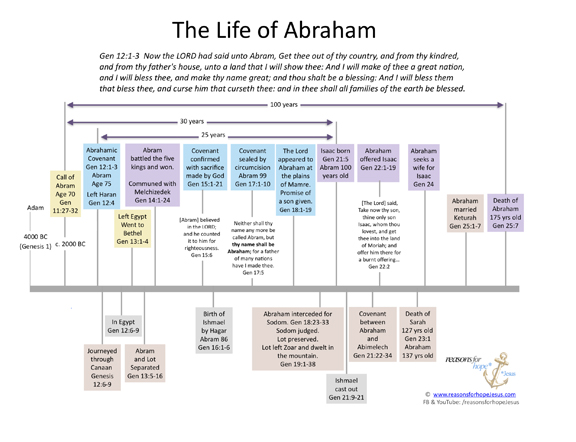
The previous chapter tells the story of how Abraham’s servant found a wife for Isaac from among Abraham’s people. This chapter rushes to fill in the details of the end of Abraham’s life before beginning the story of Isaac’s years as patriarch.
Abraham marries another woman and has six sons with her, eventually sending them all away from Isaac. Abraham dies and is buried with Sarah. Ishmael’s 12 sons are listed, and then his death is recorded, as well.
Finally, Isaac’s twin boys are born in response to his prayer to the Lord.
This is another great chapter of the Bible. It records the death of Abraham and the birth of the twins, Esau and Jacob, to Isaac and Rebekah.
It gives the generations of Ishmael and also the generations of Isaac. Then there is the incident relative to the birthright. So this is a remarkable chapter, and it covers a great deal of ground.
This chapter concludes the account of Abraham’s life, but, frankly, his story ended back in chapter 23 when he sent the servant out to get a bride for Isaac.
Genesis 26
THEME:
- God reaffirms His covenant to Isaac
- Isaac misrepresents Rebekah
- Isaac in Gerar
- Isaac goes to Beer-sheba
Genesis 26 seems to jump back in time to the season before Jacob and Esau were born, as described in the previous chapter. This is common in ancient literature.
The Lord establishes and renews His covenant promises to Isaac, blessing him abundantly in the land of Philistines during a time of famine. Eventually, Abimelech sends Isaac away due to his growing power and disputes over water rights, but they end up forming a peace treaty.
Esau’s marriage to foreign women creates strife, adding more fuel to the controversy which is soon to occur. In the next chapter, Jacob will steal his older brother’s rightful blessing.
Isaac repeats the ruse his father used in Egypt and Gerar many years earlier. Abraham told another Abimelech (likely the father or grandfather of this Philistine king) that Sarah was his sister to avoid being killed.
Isaac tries the same trick for the same reason but is soon found out. Many rulers in that day would have killed or severely punished a man for telling such tales and jeopardizing their reign. By GOD’s Grace and Mercy, Abraham and Isaac not only survive, but they grow rich from the experiences.
Genesis 27
THEME:
- Jacob takes Esau’s birthright
- Jacob flees to Laban
Prior chapters described the prosperity of Isaac, living in the Valley of Gerar. Genesis 27 leaps forward to near the end of Isaac’s life. The time has come to pass on the family blessing.
Isaac’s intention to give that blessing to firstborn, Esau, is thwarted by the deception of Isaac’s wife Rebekah and his other son Jacob. Isaac overcomes his suspicions that the man before him is not Esau and delivers the very blessing of God on Jacob.
Esau is left with a near-curse and a murderous rage. Rebekah urges Jacob to go to her brother’s household, a plan Isaac will endorse in the following chapter. There, he will ironically experience the sting of deception in his own life.
This chapter has as its theme Jacob and Rebekah conniving to get the blessing of Isaac for Jacob. It is the blessing which Isaac intended for Esau.
You see, Jacob wanted the blessing of his father. He knew God had promised his mother that the elder would serve the younger; so the blessing was his already.
However, he did not believe God. Rebekah, his mother, did not believe God. Evidently Isaac, the father, didn’t believe God or he would never have attempted to bypass Jacob and give the blessing to Esau.
He followed his own feelings and appetite in contradiction He followed his own feelings and appetite in contradiction to the distinct Word of God.
The method Jacob used in obtaining the birthright cannot be supported on any grounds whatsoever. He used fraud and deceit. His conduct was despicable.
God did not condone this any more than He condoned the conduct of Sarah and Abraham in the matter of Hagar and Ishmael. God could not use the trickery and cleverness of Jacob.
As we shall see, God deals with this man in a very definite way. Jacob had to pay for his sin in the same coin in which he sinned. You will note that as we get into this chapter.
Chapter 26 concluded with Esau, who was about forty years old, marrying two Hittite women. This was a grief to Isaac and to Rebekah.
Now they recognize that, if Jacob is not to marry a Hittite or a Philistine, he must be sent away to Haran where Isaac got his bride from the family of Abraham.
Genesis 28
THEME:
- God appears to Jacob at Bethel
- Jacob makes a vow
The previous chapter concluded with Rebekah urging Jacob to run for his life to her brother’s household in Mesopotamia to escape the wrath of Esau. Now Isaac, too, sends Jacob to Laban, except to find a non-Canaanite wife.
Hearing this, Esau marries one of the daughters of Ishmael. On the road to Mesopotamia, the Lord appears to Jacob in a dream. God personally delivers the covenant promises of Abraham and assurances to be with Jacob.
In awe and fear, Jacob renames the place Bethel, ”house of God,” and vows to worship the Lord as his God. In the next chapter, Jacob will get a taste of his own deceptive medicine, as he seeks a wife.
When the Lord told Abraham to leave Haran and travel to Canaan, most of his relatives remained in Northern Mesopotamia in towns between the Tigris and Euphrates Rivers.
The area southwest of Haran becomes known as Paddan-aram (the plain of Aram). Abraham and some of the other patriarchs continue to see this land and its people as their own. This is why Jacob and his family are known as Arameans (Deuteronomy 26:5).
Dreams are a bit mysterious. There are many theories about what dreams are and why we dream, but no one knows for sure.
What is sure is that at times in the Scriptures God uses dreams to reveal Himself to His covenant partners. Certainly not everyone has revelatory dreams, and not all dreams are revelatory.
But sometimes, on special occasions, when it suits God’s purposes, dreams can be a vehicle to see, hear, and experience reality as God knows it.
It happens here with Jacob, who has not yet fully embraced the Eternal as his God; and it continues to happen in both testaments with Joseph, Daniel, Peter, and others.
Genesis 29
THEME:
- Jacob meets Rachel
- Jacob serves for Rachel
- Jacob is deceived
The previous chapter described Jacob fleeing from home to seek his uncle in Mesopotamia. This was both to escape the rage of his brother, Esau, and to look for a suitable wife. Now Jacob arrives and falls in love with his uncle’s daughter Rachel.
After working seven years to marry her, Jacob is tricked by his uncle into marrying the older daughter, Leah, instead. Laban allows Jacob to marry Rachel, as well, in exchange for another seven years’ work.
Though she is unloved by Jacob, the Lord notices Leah’s heartbreak and allows her to bear four sons. In the next chapter, Rachel’s jealousy sets off something of a birth war, as she and Leah compete to obtain children.
Over this chapter I would like to write: “Be not deceived; God is not mocked: for whatsoever a man soweth, that shall he also reap.
For he that soweth to his flesh shall of the flesh reap corruption; but he that soweth to the Spirit shall of the Spirit reap life everlasting” (Gal. 6:7–8).
Probably the title that we ought to put over this chapter is “Chickens Come Home to Roost.” In the beginning of this chapter we will see that Jacob begins to reap the harvest of his evil doing.
The passage in Galatians is written primarily for Christians, but it expresses a universal law of God in every age. It is true in any area of life. You sow corn: you reap corn. You sow cotton; you reap cotton. You sow wheat; you reap wheat. You sow tares; you reap tares.
Examples of this principle run all the way through the Scriptures. For instance, Pharaoh slew the male children of the Hebrews, and in time his son was slain by the death angel.
Ahab, through false accusations, had Naboth slain and the dogs licked his blood. God sent His prophet Elijah to Ahab with the message that, as the dogs had licked the blood of Naboth, they would lick the blood of Ahab. And that was literally fulfilled.
You remember that David found this to be an inexorable law which was applicable to his own life. He committed the terrible sins of adultery and murder. God forgave him for his sin. Yet, the chickens came home to roost. He reaped what he had sown. His own daughter was raped and his son slain.
Even Paul the apostle felt the weight of this law. He had given his consent at the stoning of Stephen. Later, Paul was taken outside the city of Lystra and was stoned and left for dead.
Jacob is the classic illustration of this inflexible law. Jacob had lived by his wits. He was rather cocky and clever. He had practiced deceit. He would stoop to use shady methods to accomplish his purpose. And he was proud of his cleverness.
But he will reap what he has sown. As we come to this chapter, Jacob leaves Bethel and resumes his journey. After a period of time (I do not know how long), he arrives in Haran.
Genesis 30
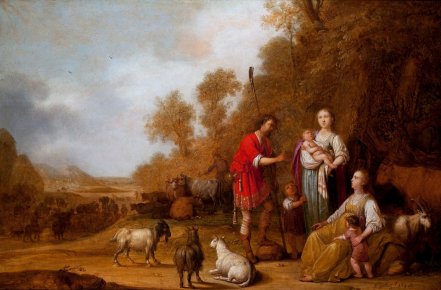
THEME:
- Birth of Jacob’s sons
- Birth of Joseph to Rachel
- Jacob prepares to leave Laban
In the previous chapter, Laban tricked Jacob both into marrying Leah along with Rachel and into working for him as a servant for a total of fourteen years. God blessed unloved Leah by allowing her to bear four sons to Jacob.
As this chapter opens, Rachel remains barren while Leah and both of their servant women continue to bear sons. Finally God answers Rachel’s prayer, allowing her to bear Joseph. His contract completed, Jacob demands Laban send him away to his own people.
Laban refuses, asking Jacob to set new terms for his service. Jacob’s deal, along with the Lord’s blessing and his unusual breeding practices with the flocks, results in Jacob becoming a wealthy man in his own right. This wealth and power will enable him to finally break free and return home.
What Rachel suggests is not at all improper for her time. As you may recall, Sarah and Abraham had a similar situation with Hagar (16:1–4).
Custom allows for these kinds of arrangements, just as technology today allows for an infertile woman to have a child through a surrogate.
Any child born to Bilhah is regarded as Rachel’s, because she has the right to name the child. As we have seen, the naming of a child carries great significance.
Genesis 31
THEME:
- Jacob flees from Haran
- The Mizpah covenant
Genesis 30 described the dramatic expansion of Jacob’s family and property. Now, after twenty years of working for Laban, the time comes for Jacob to return to his own people. He attempts to sneak away without telling Laban, but Laban soon catches up with him.
After bitter confrontations, father and son-in-law make a covenant of separation and peace. Jacob is finally free to begin the next chapter of his life in the Promised Land.
First, though, he will need to deal with his brother Esau, whose rage was the main reason Jacob fled in the first place. That encounter is described over the following two chapters.
Jacob, the heel-catcher, has met a kindred spirit. Both men are deceivers and manipulators. Both do whatever they can to get the better of the other. It just comes naturally.
Laban tricks Jacob first by marrying him to Leah before Rachel. Then, after Jacob and he agree on a clear strategy to separate the flocks, Laban goes behind his back and takes away the animals that rightfully belong to Jacob.
But Jacob is crafty, too, and he devises a way to produce striped, speckled, and spotted animals from Laban’s flocks.
After the many years of service, Jacob finally outwits Laban and gains a more valuable flock in the process.
Deception may work for a while, but there are dire consequences that come with it. Jacob’s situation is about to change, and it isn’t long before his deceptive days are behind him.
Genesis 32
THEME:
- Crisis in the life of Jacob
- Wrestling at Peniel
- Jacob’s name changed to Israel
Jacob came to work for Laban while running from the murderous rage of his twin brother, Esau. Jacob was routinely cheated by Laban, eventually resolving to go back home along with his entire family.
Unfortunately, this means coming back to face Esau. Jacob soon learns that Esau is headed his way with 400 men.
Are they coming to kill Jacob in revenge for his deceit in stealing Isaac’s blessing 20 years earlier?
Jacob is afraid. He divides his large company into two camps. He prays earnestly to God for deliverance, and he prepares a huge gift to appease Esau.
Finally, alone in the dark, Jacob physically grapples with a mysterious man who turns out to be God Himself, in some form. The man questions Jacob, changes his name to Israel, and pronounces a blessing. Thus prepared, Jacob will finally be reunited with his brother in the next chapter.
Jacob has come to the end of himself. He has struggled with his brother and the rest of his family for his entire life.
He was born a “heel-catcher,” a deceiver, and he lived the part well. But he can’t go on like this any longer. With Esau on his way, by this time tomorrow he could well be dead and his family killed or captured.
He desperately needs God’s blessing and protection, so he grieves and agonizes through the night. Through stabbing pain Jacob demands a blessing from his unknown assailant, but he cannot receive it until he confesses his name.
Once he does, his name is changed. No longer is he known as Jacob; from now on he is “Israel,” he who wrestles with God. This is the turning point in Jacob’s life.
He lays aside his former self and takes up a new name, a new identity. If Jacob is to be the one to carry on God’s covenant and the source of universal blessing, he has to change.
Genesis 33
THEME:
- Jacob meets Esau
- Jacob journeys to Shalem
Jacob has just left a miraculous encounter with God, which left him with a new name and a limp (Genesis 32). When finally faced with meeting Esau, he is pleasantly surprised. Esau runs to Jacob to hug and kiss him. They weep together.
After meeting Jacob’s family, Esau tries to refuse Jacob’s enormous gift. Jacob insists, saying that seeing Esau’s face is as seeing the face of God. Jacob, refuses to travel back to Seir and instead journeys to Shechem.
This sets up a tragic instance of assault and revenge, involving Jacob’s daughter, Dinah.
In the previous chapter we saw the high point in the life of Jacob, which was his encounter with God. On that night “a man” wrestled with him, and the “man,” not Jacob, did the wrestling.
Jacob was not looking for another fight. He has Uncle Laban in back of him and Brother Esau ahead of him, and the last time he saw both of them they were breathing out threatenings against him. This man Jacob is not in a position to take on someone else.
Therefore, the “man” took the initiative; He was the aggressor. He was, as we have seen, the pre-incarnate Christ. Jacob resisted Him until the touch of God crippled him.
Then, recognizing at last who He was, Jacob clung to Him until He blessed him. From this point on we will begin to see a change in Jacob. As we follow his life in the chapter before us, we will think that we have met a new man. To tell the truth, he is a new man.
Genesis 34
THEME:
- Dinah defiled by Shechem
- Simeon and Levi slay the men of Hamor
With the blessing of the Lord, Jacob has survived his reunion with his brother Esau and settled his family in the land of Canaan, in a city called Shechem. Some time passes and then Jacob’s daughter Dinah is raped by the son of the ruler of the city.
To exact revenge and defend their sister’s honor, Jacob’s sons trick the men of the city into being circumcised and then slaughter all of them when they are recovering, plundering all the wealth of the people.
This creates fear in the local Canaanite communities, who avoid future confrontation with Jacob’s family.
Young persons, especially females, are never so safe and well off as under the care of pious parents. Their own ignorance, and the flattery and artifices of designing, wicked people, who are ever laying snares for them, expose them to great danger.
They are their own enemies if they desire to go abroad, especially alone, among strangers to true religion. Those parents are very wrong who do not hinder their children from needlessly exposing themselves to danger.
Indulged children, like Dinah, often become a grief and shame to their families. Her pretence was, to see the daughters of the land, to see how they dressed, and how they danced, and what was fashionable among them; she went to see, yet that was not all, she went to be seen too.
She went to get acquaintance with the Canaanites, and to learn their ways. See what came of Dinah’s gadding. The beginning of sin is as the letting forth of water.
How great a matter does a little fire kindle!
We should carefully avoid all occasions of sin and approaches to it.
The Shechemites submitted to the sacred rite, only to serve a turn, to please their prince, and to enrich themselves, and it was just with God to bring punishment upon them.
As nothing secures us better than true religion, so nothing exposes us more than religion only pretended to. But Simeon and Levi were most unrighteous.
Those who act wickedly, under the pretext of religion, are the worst enemies of the truth, and harden the hearts of many to destruction. The crimes of others form no excuse for us.
Alas! how one sin leads on to another, and, like flames of fire, spread desolation in every direction! Foolish pleasures lead to seduction; seduction produces wrath; wrath thirsts for revenge; the thirst of revenge has recourse to treachery; treachery issues in murder; and murder is followed by other lawless actions.
If we were to trace the history of unlawful commerce between the sexes, we should find it, more than any other sin, ending in blood.
Genesis 35
THEME:
- Jacob returns to Bethel
- God renews the covenant
- Rachel dies at the birth of Benjamin
- death of Isaac
Recent events have left Jacob fearful of the people of the land. His sons slaughtered an entire town to avenge their sister’s rape. However, God apparently uses this bloodshed to inspire fear.
Nobody attacks Jacob’s family as they travel to Bethel, setting up an altar and renewing their covenant with God. Rachel dies giving birth to Benjamin. Jacob’s eldest son sleeps with one of his servant-wives, losing his birthright.
Isaac dies, and Jacob and Esau bury him in the family burial cave in Mamre. The story then focuses on Jacob’s sons, primarily Joseph, as the family finds themselves drawn into Egypt.
Genesis is filled with moral failures and ethical dilemmas, the kinds of things that happen in real life. Abraham’s children are not perfect people; they — like the rest of us — are deeply flawed and conflicted over the tough moral choices we all have to make.
After Dinah is forcibly raped:
- What are her brothers to do to protect her and restore their family honor?
- How is justice to be done?
- How can they make things right?
These are important questions. The desire to protect those you love and to make things right is a noble impulse, but ignoble deeds follow.
Skilled in deception, her brothers use circumcision — their covenant obligation — to temporarily disable the men and make them vulnerable to attack.
After the carnage, Jacob, the older, wiser head of the family, knows the score: actions like these have consequences. Violence only breeds more violence. If they are to survive, they must leave… soon.
Genesis 36
THEME:
- Esau moves from Canaan to Mount Seir
Genesis 35 concludes with the death of Isaac. It marks the end of the story arc which focused on him (Genesis 25:19). Genesis 36 briefly describes the generations of Esau, Jacob’s twin brother, listing his sons, grandsons, and the kings of Edom, the nation that came from Esau.
This is parallel to how Genesis 25:12–18 relayed the fate of Ishamel, another son who did not carry the line of promise. Genesis 37 begins the generations of Jacob, focusing mostly on the story of Joseph.
The registers in this chapter show the faithfulness of God to his promise to Abraham. Esau is at this point, in a place called Edom, that name which kept up the remembrance of him selling his birthright for a mess of pottage.
Esau continued the same profane despiser of heavenly things. In outward prosperity and honor, the children of the covenant are often behind, and those that are out of the covenant get the start.
We may suppose it a trial to the faith of God’s Israel, to hear of the pomp and power of the kings of Edom, while they were bond-slaves in Egypt; but those that look for great things from God, must be content to wait for them; God’s time is the best time.
Mount Seir is called the land of their possession. The land of Canaan was at this time only the land of promise. Mount Seir was in the possession of the Edomites.
The children of this world have their all in hand, and nothing in hope; while the children of God have their all in hope, and next to nothing in hand.
But, all things considered, it is beyond comparison better to have the land of Canaan in promise, than Mount Seir in possession.
Genesis 37
THEME:
- Cause of strife in Jacob’s family
- the dreams of Joseph
- Jacob sends Joseph to his brethren
- Joseph sold into slavery
Following the death of Isaac and the story of Esau’s people, Genesis begins a section called the “generations of Jacob.” The story will focus primarily on Jacob’s son Joseph. Joseph is deeply hated by his brothers.
While alone with him in the wilderness, they sell him to slave-traders, who take Joseph to Egypt. Chapter 38 details some of the scandals which happened while Joseph was gone. Genesis 39 will resume a focus on Joseph’s experiences.
In Joseph’s history we see something of Christ, who was first humbled and then exalted.
It also shows the lot of Christians, who must through many tribulations enter into the kingdom. It is a history that has none like it, for displaying the various workings of the human mind, both good and bad, and the singular providence of God in making use of them for fulfilling his purposes.
Though Joseph was his father’s darling, yet he was not bred up in idleness.
Those do not truly love their children, who do not use them for business, and labour, and hardships. This handling of children is with good reason called spoiling them.
Those who are trained up to do nothing, are likely to be good for nothing. But Jacob made known his love, by dressing Joseph in finer clothing than the rest of his children.
It is wrong for parents to make a difference between one child and another, unless there is great cause for it, by the children’s dutifulness, or undutifulness. When parents make a difference, children will notice it very soon, and it leads to quarrels in families.
Jacob’s sons did that when they were not around him, which they would not have done at home with him; but Joseph gave his father an account of their ill conduct, that he might restrain them. Not as a talebearer, to sow discord, but as a faithful brother.
God gave Joseph’s betimes the prospect of his advancement, to support and comfort him under his long and grievous troubles. Joseph dreamed of his preferment, but he did not dream of his imprisonment.
Thus many young people, when setting out in the world, think of nothing but prosperity and pleasure, and never dream of trouble.
His brethren rightly interpreted the dream, though they abhorred the interpretation of it. While they committed crimes in order to defeat it, they were themselves the instruments of accomplishing it.
Thus the Jews understood what Christ said of his kingdom. Determined that he should not reign over them, they consulted to put him to death; and by his crucifixion, made way for the exaltation they designed to prevent.
How readily does Joseph wait his father’s orders?
Those children who are best beloved by their parents, should be the most ready to obey them. See how deliberate Joseph’s brethren were against him. They thought to slay him from malice aforethought, and in cold blood.
Whosoever hateth his brother is a murderer. The sons of Jacob hated their brother because their father loved him. New occasions, as his dreams and the like, drew them on further; but this laid rankling in their hearts, till they resolved on his death.
God has all their hearts in his hands. Reuben had most reason to be jealous of Joseph, for he was the first-born; yet he proves his best friend.
God overruled all to serve his own purpose, of making Joseph an instrument to save many living people. Joseph was a type of Christ; for though He was the beloved Son of His Father, and hated by a wicked world, yet the Father sent Him out of his bosom to visit us in great humility and love.
He came from heaven to earth to seek and save us; yet then malicious plots were laid against Him. His own not only received Him not, but crucified Him. This He submitted to, as a part of His design to redeem and save us.
They threw Joseph into a pit, to perish there with hunger and cold; so cruel were their tender mercies.
They slighted him when he was in distress, and were not grieved for the affliction of Joseph; for when he was pining in the pit, they sat down to eat bread. They felt no remorse of conscience for the sin.
But the wrath of man shall praise God, and the remainder of wrath He will restrain. Joseph’s brethren were wonderfully restrained from murdering him, and their selling him as wonderfully turned to God’s praise.
When Satan has taught men to commit one sin, he teaches them to try to conceal it with another; to hide theft and murder, with lying and false oaths: but he that covers his sin shall not prosper long.
Joseph’s brethren kept their own and one another’s counsel for some time; but their villany came to light at last, and it is here published to the world.
To grieve their father, they sent him Joseph’s coat of colors; and he hastily thought, on seeing the bloody coat, that Joseph was rent in pieces.
Let those that know the heart of a parent, suppose the agony of poor Jacob. His sons basely pretended to comfort him, but miserable, hypocritical comforters were they all. Had they really desired to comfort him, they might at once have done it, by telling the truth.
The heart is strangely hardened by the deceitfulness of sin.
Jacob refused to be comforted. Great affection to any creature prepares for so much the greater affliction, when it is taken from us, or made bitter to us: undue love commonly ends in undue grief.
It is the wisdom of parents not to bring up children delicately, they know not to what hardships they may be brought before they die.
From the whole of this chapter we see with wonder the ways of Providence. The malignant brothers seem to have gotten their ends; the merchants, who care not what they deal in so that they gain, have also obtained theirs; and Potiphar, having got a fine young slave, has obtained his!
But God’s designs are, by these means, in train for execution.
This event shall end in Israel’s going down to Egypt; that ends in their deliverance by Moses; that in setting up the true religion in the world; and that in the spread of it among all nations by the gospel.
Thus the wrath of man shall praise the Lord, and the remainder thereof will he restrain.
Genesis 38
THEME:
- The sin and shame of Judah
Genesis 38 departs from the story of Joseph (Genesis 37:26–28) to describe what happens when Judah moves away from his family at Hebron and marries a Canaanite woman.
Two of his three sons are put to death by God, each while married to the same woman. When Judah abandons her, she works a scheme to trick him into having sex with her.
Confronted with proof that he is the father in her scandalous pregnancy, she is allowed to live and gives birth to Judah’s twin boys. The following chapter returns to a focus on Joseph and his rise within Egyptian society (Genesis 39:1).
The profligate conduct of Judah and his family. This chapter gives an account of Judah and his family, and such an account it is, that it seems a wonder that of all Jacob’s sons, our Lord should spring out of Judah.
But God will show that his choice is of grace and not of merit, and that Christ came into the world to save sinners, even the chief.
Also, that the worthiness of Christ is of himself, and not from his ancestors. How little reason had the Jews, who were so called from this Judah, to boast as they did.
What awful examples the Lord proclaims in his punishments, of his utter displeasure at sin!
Let us seek grace from God to avoid every appearance of sin.
And let that state of humbleness to which Jesus submitted, when he came to put away sin by the sacrifice of himself, in appointing such characters as those here recorded, to be his ancestors, endear the Redeemer to our hearts.
Genesis 39
THEME:
- Overseer in the house of Potiphar
- tempted, then framed by Potiphar’s wife
- Joseph imprisoned
In chapter 37, Joseph narrowly escaped being murdered by his own brothers (Genesis 37:18–20), only to be sold as a slave (Genesis 37:26–28). Chapter 39 picks up his story after taking a detour into the scandalous life of Judah.
Though a slave in Egypt, Joseph thrives under the Lord’s blessing. He rises to the top position in his master’s household, only to be jailed on a false accusation of attempted rape.
Still, Joseph continues to be blessed by God, again rising to become the jailer’s most trusted servant. Joseph’s reputation and ability to interpret dreams will factor into his rise within the government of Egypt.
This disturbing chapter is artfully inserted at the beginning of Joseph’s story for a reason.
Though Joseph has the key role in getting Israel to Egypt and saving his family from the upcoming famine, it is Judah’s line that is chosen by God to play a crucial part in Israel’s more distant future.
Judah’s son, Perez, is the ancestor to King David and ultimately to the Anointed One (Matthew 1). But Perez’s strange birth is overshadowed by the sleazy events that lead to his conception.
The sexually-charged atmosphere of this chapter may well upset some, but Scripture is brutally honest about people and what they do.
Lust and lies, deception and prostitution do not frustrate God’s plan; in fact God has a way of taking them, redeeming them, and including them within His greater will.
Genesis 40
THEME:
- Joseph interprets dreams for the butler and baker
- fulfillment of the dreams
Joseph remains in prison after being accused of attempted rape by Potiphar’s wife (Genesis 39:11–15). The Lord blesses Joseph even in jail (Genesis 39:21–23), but he longs to get out.
His chance for release comes through an opportunity to interpret the dreams of two fellow prisoners. The dreams reveal that one will be restored to his old position, while the other will be killed.
Joseph pleads with the servant to be restored, asking him to to plead with Pharaoh to get Joseph released, but the man fails to do so. Two years later (Genesis 41:1), another dream requires explanation, and Joseph will finally be freed (Genesis 41:12–14).
 The chief butler and baker of Pharaoh in prison, Their dreams interpreted by Joseph.
The chief butler and baker of Pharaoh in prison, Their dreams interpreted by Joseph.
The ingratitude of the chief butler. It was not so much the prison that made the butler and baker sad, as their dreams.
God has more ways than one to sadden the spirits. Joseph had compassion towards them. Let us be concerned for the sadness of our brethren’s countenances.
It is often a relief to those that are in trouble to be noticed. Also learn to look into the causes of our own sorrow.
- Is there a good reason?
- Is there not comfort sufficient to balance it, whatever it is?
- Why art thou cast down, O my soul?
Joseph was careful to ascribe the glory to God. The chief butler dream foretold his advancement. The chief baker dream foretold his death. It was not Joseph’s fault that he brought the baker no better tidings.
And thus ministers are but interpreters; they cannot make the thing otherwise than it is: if they deal faithfully, and their message prove unpleasing, it is not their fault.
Joseph does not reflect upon his brethren that sold him; nor does he reflect on the wrong done him by his mistress and his master, but mildly states his own innocence.
When we are called on to clear ourselves, we should carefully avoid, as much as may be, speaking ill of others. Let us be content to prove ourselves innocent, and not upbraid others with their guilt.
 Joseph’s interpretation of the dreams came to pass on the very day fixed.
Joseph’s interpretation of the dreams came to pass on the very day fixed.
On Pharaoh’s birthday, all his servants attended him, and then the cases of these two came to be looked into.
We may all profitably take notice of our birthdays, with thankfulness for the mercies of our birth, sorrow for the sinfulness of our lives, and expectation of the day of our death, as better than the day of our birth.
But it seems strange that worldly people, who are so fond of living here, should rejoice at the end of one year after another of their short span of life.
A Christian has cause to rejoice that they were born, also that they come nearer to the end of their sin and sorrow, and nearer to their everlasting happiness.
The chief butler remembered not Joseph, but forgot him. Joseph had deserved well at his hands, yet he forgot him. We must not think it strange, if in this world we have hatred shown us for our love, and slights for our kindness.
See how apt those who are themselves at ease are to forget others in distress. Joseph learned by his disappointment to trust in God only. We cannot expect too little from man, nor too much from God.
Let us not forget the sufferings, promises, and love of our Redeemer. We blame the chief butler’s ingratitude to Joseph, yet we ourselves act much more ungratefully to the Lord Jesus.
Joseph had but foretold the chief butler’s enlargement, but Christ wrought out ours; he mediated with the King of Kings for us; yet we forget him, though often reminded of him, and though we have promised never to forget him.
Genesis 41
THEME:
- The dreams of Pharaoh
- Joseph is made overseer of Egypt
- Joseph’s two sons—Manasseh and Ephraim
Joseph was sold into slavery by his own brothers (Genesis 37:24–28). He then excelled in his work for an Egyptian official, only to be falsely accused and imprisoned (Genesis 39:20).
There, he accurately interpreted dreams for servants of the Egyptian ruler (Genesis 40:20–22). Unfortunately, the restored cupbearer failed to mention Joseph, leaving him in prison for two more years (Genesis 40:23).
A series of disturbing dreams leads to Joseph’s audience with Pharaoh. This, in turn, leads to Joseph becoming the second most powerful man in the nation.
The following chapters emphasize Joseph’s reunion with his family. Details about his administration of food during the famine are recorded in Genesis 47:13–26.
Although the text is not descriptively clear, the chief baker dies a particularly gruesome death.
The way the story is told, Pharaoh lifts up the baker’s head — a gesture which would seem to signal royal favor — but in the next treacherous instant, his head is removed.
Then his lifeless corpse is impaled on a tree, exposed to the elements.
Because the body is left to rot outside and be eaten by birds — instead of being carefully embalmed and entombed — the Egyptians believe the victim’s soul can never enter the afterlife.
This is the worst form of capital punishment, leaving the cup bearer to fear not only death but also eternal oblivion.
Pharaoh wants there to be no doubt that Joseph is his second-in-command:
- So he holds a formal ceremony and presents Joseph with special gifts, symbols of high office and power.
- He gives Joseph his signet ring, mounted with Pharaoh’s personal seal.
- He dresses him in royal garb and provides him with the finest chariot available.
- He issues decrees that put Joseph in charge of all affairs in Egypt.
- Finally, to top it off and to make sure this son of Israel would be fully accepted into Egyptian society, he gives him an Egyptian name and arranges a marriage with a high-profile priestly family.
Just a few hours before, Joseph was a prisoner. Now he is in charge of all the land.
Genesis 42
THEME:
- Jacob sends ten sons to Egypt
- Simeon left as hostage
- nine brothers return home
Twenty years prior to the events of this chapter, Joseph’s brothers sold him into slavery (Genesis 37:28). Miraculously, Joseph is now the governor of the nation of Egypt (Genesis 41:44).
His brothers, who know nothing of Joseph’s fate, have come to buy food during a terrible famine (Genesis 41:56–57). Joseph, probably and justifiably angry at his brothers, keeps his identity a secret, at first.
Over the next several chapters, he will test, challenge, and chasten them. Yet there is no revenge involved; everything Joseph does furthers a long-term goal of rescuing the family from starvation.
Famine in this part of the world normally involves a drought that extends for years. Only those with access to bodies of fresh water can survive.
The Egyptians are perfectly positioned to use the Nile River to irrigate their crops during a drought. Most of the land of Canaan, on the other hand — where Jacob and his sons still live — has little fresh water even when there is no drought.
Although some grain can be moved up and down the Nile or across the Mediterranean over established trade routes, the amount of grain needed to keep large populations alive cannot be moved across land or sea. So people have to go where the food is, or they starve to death.
Israel knows he is out of options at home, so he has to look abroad.
Genesis 43
THEME:
- Jacob sends his sons to Egypt
- the brothers are entertained in Joseph’s home
In Genesis chapter 37, Jacob sends his favorite son, Joseph, to visit his brothers. Joseph does not come home.
In chapter 42, Jacob sends ten of his sons on a mission, and once again the group returns short one son. The Egyptian governor keeps Simeon as collateral and commands the family to return with Benjamin. Only when forced with starvation does Jacob risk his youngest son.
Joseph, still unrecognized by his brothers as the governor of Egypt, honors the men as guests in his home, paying special attention to Benjamin. After further tests in chapter 44, Joseph will finally reveal himself in chapter 45.
The brothers of Joseph are in the dark:
- What does this mean?
- Is this some sort of trick?
- Has someone planted the money there only to later claim it or the grain has been stolen?
- Are the Egyptians even now bearing down on them?
- Is this part of the test?
- Should they go back and tell the gruff Egyptian governor what has happened?
- And if they do, will he believe them?
- What happens to Simeon?
They have a thousand thoughts, but their most profound thought occurs next.
Genesis 44
THEME:
- Joseph sends his brothers home
- Judah volunteers to take Benjamin’s place
Joseph maintained his hidden identity when his estranged brothers first arrived in Egypt (Genesis 42).
When they returned a second time, he continued to test them and treated them to a fine meal (Genesis 43). Genesis 44 describes Joseph’s final scheme to test the character of his brothers.
Will they once again abandon a sibling into slavery?
After a successful scheme by Joseph, Benjamin seems doomed to become a slave in Egypt. Judah boldly begs Joseph to keep him, instead. He offers himself in Benjamin’s place.
This finally overwhelms Joseph, who will break down and reveal himself in the next chapter.
Judah speaks the truth.
God has uncovered their guilt and exposed it for all to see.
Not that someone in their party has stolen Joseph’s cup — that’s not what he means — but years ago they conspired and stole Joseph’s freedom.
Ironically they could now lose their freedom to Joseph.
Genesis 45
THEME:
- Joseph reveals his identity
- Joseph invites his family to Egypt
Genesis 44 concluded with an impassioned speech from Judah, offering to sacrifice himself for his younger brother. Overwhelmed with emotion, Joseph breaks down and finally reveals his identity to his brothers.
He urges them to move Jacob’s entire family to Egypt to survive the famine. Jacob agrees, leading to the migration and resettlement depicted in Genesis 46. The remainder of Genesis describes the happy results of this relocation.
Judah has come a long way.
He is no longer the selfish young man who conspired with his brothers to sell Joseph into slavery (37:26–27).
Though he knew that decision would have a devastating effect on his father, Judah did not seem to care. Nor is he the lustful man who propositioned the prostitute who happened to be his daughter-in-law (38:1–30).
Now he is different. His priorities have changed. He is willing to sacrifice his freedom and future to save his father the grief of losing Benjamin.
Judah’s transformation is not immediate; it takes years to accomplish. But his place in the family and his selfless example impact the children of Israel for generations to come.
Once again Joseph and his brothers are parting company.
But this time is much different: they know where he is and who he has become.
Although Joseph has been separated from his brothers for many years, he remembers how they were; and he is counting on the fact that they are a quarrelsome bunch.
He has intentionally given Benjamin more money and clothes than the others. That in itself is enough to cause bickering and squabbling among the crew.
In addition, he knows they are worried. They have just received quite a shock. To learn after all these years that the brother they sold into slavery has become one of the most powerful men in the world takes time to process.
The famine, the journey from Canaan, and the shock of seeing him again have taken a toll on them. Now they have to go back, get their families, and return.
The road home leaves plenty of time to worry about what might become of them, plenty of time for nerves to fray and anger to stir. Joseph knows they have a hard journey ahead, and they need to pull together and not apart.
Genesis 46
THEME:
- Jacob and family move to Egypt
- Jacob and Joseph reunited
Joseph has just been dramatically reunited with his estranged brothers (Genesis 45). Following Joseph’s revelation of his identity Genesis 46 describes the large family’s move out of Canaan.
Jacob stops in Beersheba to offer sacrifices to God and receive renewed promises from Him. Then the story pauses to provide a count of Joseph’s descendants by each of his four wives.
Jacob is reunited with Joseph, who prepares his family to meet with Pharaoh. Chapter 47 describes Jacob’s meeting with Pharaoh and the family’s settlement in Goshen.
God’s promises to Jacob.
Even as to those events and undertakings which appear most joyful, we should seek counsel, assistance, and a blessing from the Lord.
Attending on his ordinances, and receiving the pledges of his covenant love, we expect his presence, and that peace which it confers. In all removals we should be reminded of our removal out of this world.
Nothing can encourage us to fear no evil when passing through the valley of the shadow of death, but the presence of Christ.
We have here a particular account of Jacob’s family. Though the fulfilling of promises is always sure, yet it is often slow.
It was now 215 years since God had promised Abraham to make of him a great nation; yet that branch of his seed, to which the promise was made sure, had only increased to seventy, of whom this particular account is kept, to show the power of God in making these seventy become a vast multitude.
It was justice to Pharaoh to let him know that such a family was come to settle in his dominions.
If others put confidence in us, we must not be so base as to abuse it by imposing upon them.
But how shall Joseph dispose of his brethren?
Time was, when they were contriving to be rid of him; now he is contriving to settle them to their advantage; this is rendering good for evil. He would have them live by themselves, in the land of Goshen, which lay nearest to Canaan.
Shepherds were an abomination to the Egyptians. Yet Joseph would have them not ashamed to own this as their occupation before Pharaoh.
He might have procured places for them at court or in the army. But such preferments would have exposed them to the envy of the Egyptians, and might have tempted them to forget Canaan and the promise made unto their fathers.
An honest calling is no disgrace, nor ought we to account it so, but rather reckon it a shame to be idle, or to have nothing to do.
It is generally best for people to abide in the callings they have been bred to and used to. Whatever employment and condition God in his providence has allotted for us, let us suit ourselves to it, satisfy ourselves with it, and not mind high things.
It is better to be the credit of a mean post, than the shame of a high one. If we wish to destroy our souls, or the souls of our children, then let us seek for ourselves, and for them, great things; but if not, it becomes us, having food and raiment, therewith to be content.
Genesis 47
THEME:
- Joseph presents father and brothers to Pharaoh
- Joseph promises Jacob burial in Canaan
After describing the family’s journey from Canaan and their arrival in Egypt in chapter 46, this passage opens on a formal conversation between Pharaoh and Joseph’s family.
He officially grants their request to settle in Egypt. As the famine continues, citizens of Egypt and Canaan turn over their money, land, and livestock to Joseph in exchange for food.
The final three chapters of Genesis explain Jacob’s dying blessings, and the passing of both Jacob and Joseph.
Jacob blessed Pharaoh.
As we have seen, words spoken as a blessing have great meaning at this time.
It may be no more than a greeting spoken, such as “shalom,” which means “peace.”
However the story of Genesis prompts us to consider another possibility.
In God’s plan to redeem and reclaim His creation, He chooses Abraham and his descendants to be a blessing to all the families on earth.
Jacob, Abraham’s grandson and God’s covenant partner, speaks a blessing over Pharaoh that creates a new reality for Egypt and its king. Little does Pharaoh know that this humble nomadic family in need of his help will one day change the course of history.
Genesis 48
THEME:
- Joseph visits Jacob during his last illness
- Jacob blesses Ephraim and Manasseh
Despite a long, difficult life, Jacob survives another 17 years after moving to Egypt. The suffering of his son, Joseph, resulted in the salvation of his family line.
Now truly at the end of his days, Jacob claims Joseph’s oldest two sons as his own—giving them full rights to a portion of his inheritance.
The following chapters will include Jacob’s remaining blessings for his sons, and a description of the death and burials of both Jacob and Joseph.
Jacob bows his final bow.
Perhaps in the weakness of old age or in thankfulness for Joseph’s promise, or maybe in prayer to the Lord.
In the days of Abraham, Isaac, and Jacob, custom demands that the firstborn son become the next head of the family and inherit the name, status, and wealth of his father.
But as we have seen throughout Genesis, God makes a habit of ignoring human customs, subverting tradition, and privileging the younger over the older.
When it comes to the covenant, God typically chooses to pass its blessings and duties to the younger. The trend continues throughout Scripture as God selects David and then Solomon, both younger sons, as the two greatest kings over Israel.
It is almost humorous the way Joseph tries to engineer the situation placing Manasseh, his firstborn, at his father’s right hand to receive the greater blessing. But Israel has none of it. He crosses his hands and extends the right hand to Ephraim, the second-born.
Joseph is sure his ailing father has made a mistake. But Jacob knows exactly what he is doing.
Genesis 49
THEME:
- Jacob’s deathbed blessing and prophecy
- final words and death of Jacob
After a life of struggle and controversy, Jacob’s family has securely settled in Egypt.
Genesis 48 told of Jacob’s blessing on Joseph’s two oldest sons: Ephraim and Manasseh. In Genesis 49, Jacob gives both positive and negative predictions to each of his sons, in turn. Jacob then commands his sons to bury him in Canaan, then dies.
The final chapter of Genesis describes the family’s mourning and Joseph’s death. The opening verses of Exodus race forward some 400 years, as the nation of Israel falls into harsh slavery under new Egyptian rulers (Exodus 1:8–14).
Israel’s blessing speaks not only what is but what will be.
His words establish Judah as the father to the royal line from which King David and his dynasty will one day come.
They anticipate God’s eternal covenant with David that brings peace and prosperity to the entire world.
It is little wonder that early Christians referred to the risen Jesus as “the lion of the tribe of Judah,” for they found in Him the fulfillment of Israel’s blessing.
When Israel’s inheritance of the land is divided, Levi is not included; but Joseph’s two sons become the leaders of two tribes descended from Joseph.
Manasseh and Ephraim take Joseph’s and Levi’s places, filling out the twelve tribes.
Genesis 50
THEME:
- Burial of Jacob in Canaan
- Joseph allays the fears of his brethren
- death and burial of Joseph in Egypt
After settling in Egypt, under his son’s protection (Genesis 47—49), Jacob dies (Genesis 49:33). He is embalmed and all of Egypt mourns.
Joseph buries his father in the family tomb in Canaan, then returns to Egypt. He asks that his body be taken back to Canaan someday. This sets up the events of the book of Exodus.
Over centuries, Israel will grow into a prosperous people, only to be enslaved by a jealous Egyptian monarchy. This provides a context for God to rescue Israel and demonstrate His power.
The mourning for Jacob and His funeral.
Though pious relatives and friends have lived to a good old age, and we are confident they are gone to glory, yet we may regret our own loss, and pay respect to their memory by lamenting them.
Grace does not destroy, but it purifies, moderates, and regulates natural affection.
The departed soul is out of the reach of any tokens of our affection; but it is proper to show respect to the body, of which we look for a glorious and joyful resurrection, whatever may become of its remains in this world.
Thus Joseph showed his faith in God, and love to his father. He ordered the body to be embalmed, or wrapped up with spices, to preserve it. See how vile our bodies are, when the soul has forsaken them; they will in a very little time become noisome, and offensive.
Jacob’s body was attended, not only by his own family, but by the great men of Egypt. Now that they were better acquainted with the Hebrews, they began to respect them.
Professors of religion should endeavour by wisdom and love to remove the prejudices many have against them. Standers-by took notice of it as a grievous mourning.
The death of good men is a loss to any place, and ought to be greatly lamented.
 Joseph’s brethren crave his pardon, He comforts them.
Joseph’s brethren crave his pardon, He comforts them.
Various motives might cause the sons of Jacob to continue in Egypt, notwithstanding the prophetic vision Abraham had of their bondage there.
Judging of Joseph from the general temper of human nature, they thought he would now avenge himself on those who hated and injured him without cause.
Not being able to resist, or to flee away, they attempted to soften him by humbling themselves. They pleaded with him as the servants of Jacob’s God. Joseph was much affected at seeing this complete fulfilment of his dreams.
He directs them not to fear him, but to fear God; to humble themselves before the Lord, and to seek the Divine forgiveness. He assures them of his own kindness to them.
See what an excellent spirit Joseph was of, and learn of him to render good for evil. He comforted them, and, to banish all their fears, he spake kindly to them.
Broken spirits must be bound up and encouraged. Those we love and forgive, we must not only do well for, but speak kindly to.
Joseph’s direction concerning his bones, His death.
Joseph having honored his father, his days were long in the land, which, for the present, God had given him. When he saw his death approaching, he comforted his brethren with the assurance of their return to Canaan in due time.
We must comfort others with the same comforts with which we have been comforted of God, and encourage them to rest on the promises which are our support.
For a confession of his own faith, and a confirmation of theirs, he charges them to keep his remains unburied till that glorious day, when they should be settled in the land of promise.
Thus Joseph, by faith in the doctrine of the resurrection, and the promise of Canaan, gave commandment concerning his bones.
This would keep up their expectation of a speedy departure from Egypt, and keep Canaan continually in their minds. This would also attach Joseph’s posterity to their brethren.
The death, as well as the life of this eminent saint, was truly excellent; both furnish us with strong encouragement to persevere in the service of God.
How happy to set our early in the heavenly race, to continue steadfastly, and to finish the course with joy!
This Joseph did, this we also may do.
Even when the pains of death are upon us, if we have trusted in Him upon whom the patriarchs, prophets, and apostles depended, we need not fear to say, “My flesh and my heart faileth, but God is the strength of my heart, and my portion forever.”
I really hope you have enjoyed this page, please leave your comments in the comments box below⇓.
I hope that you have really enjoyed this post,

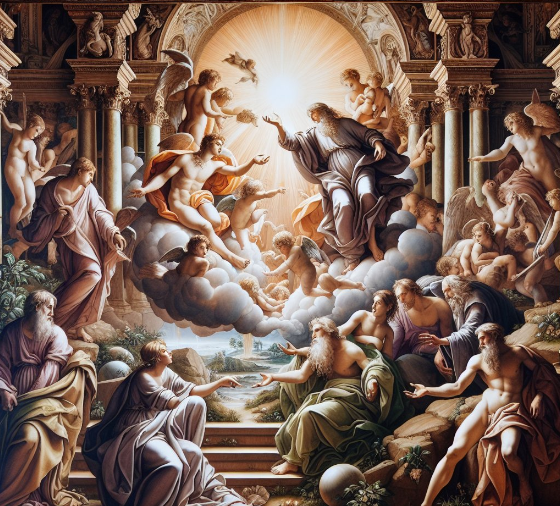













Every good book starts with a good beginning, which serves as the introduction to the book. Genesis is a fitting beginning to the Bible. This summary of all the chapters in Genesis is a brilliant synopsis of all the stories in Genesis.
I have often wondered about the length of the days when God created the earth.
I wonder if it was a 24 hour period like we have days now?
Or was a day referring to a period of time that could have been weeks or even months or years?
Thank you.
Hello,
I hope all is well with you.
While you are in the Introduction Of The Book Of Genesis – The Book Of Beginnings, if you click on Genesis 1, it goes in depth of when the evening and the morning were the first day.
Thank you for your observation about this summary of all the chapters in Genesis being a brilliant synopsis of all the stories in Genesis.
Have A Blessed Day!
Jerry
Thank you very much for this important and detailed post regarding the Introduction of the book of Genesis.
Actually, this is the best introduction about Genesis. You have shown these things very clearly. And I hope to say this, Keep posting like this.
I will definitely share this with my friends.
Hello,
Thank you for sharing your interest in the Introduction Of The Book Of Genesis – The Book Of Beginnings. We are looking forward to sharing more information with you here at Holy Bible Study & Discussion with Jerry.
Thank you for your continued support with spreading GOD’s Word.
Blessings Unto You My Friend,
Jerry
You have completed a thorough and valued outline of the first book of the Holy Bible.
Here we find the down fall of man, but also God’s plans to restore mankind. Here we find a loving and a caring God who loves mankind and wants to restore them to the original intent of fellowship in the garden.
There are many types and shadows that start with this inspiration book to show us that God would send His Son to redeem and bring us to Himself!
Allow Jesus to be the covering of your sin, for like Adam we have all sinned.
Hello,
Thank you for considering this article a thorough and valued outline. Thank you for your comments, as well as your views.
Blessings Unto You,
Jerry
This is a terrific read, a synopsis of Genesis giving a very complete review. I loved it. It helped explain a number of things that I was previously unaware of.
You do go into a lot of detail making the article a little long for me to digest in one sitting. I would suggest maybe breaking it up into bite sized chunks which I feel will encourage more readers.
The Old Testament can be difficult to understand sometimes and I think you have done a wonderful job of making it quite simple for all to take in.
Hello,
Thank you for taking the time to stop by and comment on this “Introduction”.
Blessings,
Jerry
Jerry,
You have created a unique biblical masterpiece. Although I was born and raised a Christian. I am remiss about bible studies. However, I have read through the scriptures at least two times in my lifetime. The stories are chilling and at the same time, classic. Jesus, without the shadow of doubt, is the Greatest of All Times (GOAT), hands down. What he endured is truly unfathomably.
Of course, disbelievers, agnostics, will beg to differ. Christianity does not appeal to everyone. Me, personally, I have no problem with Christianity whatsoever. It is a sacred entity, in and of itself.
However, religion and spirituality are two different mind fields. In fact, many people have honed in on their spirituality in recent times. As for me, I can see a connection between religion and spirituality.
Your website is pretty overwhelming, and I hope you will consider thinning it out a bit. You have a massive amount of information coming straight at the viewer. In all honesty, I feel it too much on the screen ALL at once. Don’t get me wrong, I love the principals of Christianity. However, I feel overpowered.
Please do not take my comments personally. This is your website, your design. My opinion is singular.
Your friend in Christ,
Rachele
Hello Rachele,
Thank you for taking the time to check out this website, so welcome to HBS & DwJ website.
I really appreciate you considering this Holy Bible Study a unique biblical masterpiece. Holy Bible Study is where I have really tuned in to my spirituality and developed a closer relationship with GOD.
I am very thankful that GOD Loves us so much that He allowed His Only Begotten Son to lay His life down, shedding His Precious Blood on Yonders Cross, taking on the sins of the whole world. Even taking on the sins of us who had not even been born at the time, continuing to mediate on the behalf of us all.
My personal relationship with GOD is the most important relationship I can have in life. Spirituality is a must for this type relationship.
HBS & DwJ website is designed for Holy Bible Study. When studying the Holy Bible, we have to do it in increments, that is the design of this website. I have broken things down so it can be studied in sections at a time.
HBS & DwJ Podcast is a great place to begin, as well as use, along with this website.
Thank you so much for your comments, they are greatly appreciated.
Your Friend In Christ As Well,
Jerry
Jerry,
You have created a unique biblical masterpiece. Although I was born and raised a Christian. I am remiss about bible studies. However, I have read through the scriptures at least two times in my lifetime. The stories are chilling and at the same time, classic. Jesus, without the shadow of doubt, is the Greatest of All Times (GOAT), hands down. What he endured is truly unfathomably.
Of course, disbelievers, agnostics, will beg to differ. Christianity does not appeal to everyone. Me, personally, I have no problem with Christianity whatsoever. It is a sacred entity, in and of itself. However, religion and spirituality are two different mind fields. In fact, many people have honed in on their spirituality in recent times. As for me, I can see a connection between religion and spirituality.
Your website is pretty overwhelming, and I hope you will consider thinning it out a bit. You have a massive amount of information coming straight at the viewer. In all honesty, I feel it too much on the screen ALL at once. Don’t get me wrong, I love the principals of Christianity. However, I feel overpowered.
Please do not take my comments personally. This is your website, your design. My opinion is singular.
Your friend in Christ,
Rachele
Hello Rachele,
Thank you for taking the time to check out this website, so welcome to HBS & DwJ website.
I really appreciate you considering this Holy Bible Study a unique biblical masterpiece. Holy Bible Study is where I have really tuned in to my spirituality and developed a closer relationship with GOD.
I am very thankful that GOD Loves us so much that He allowed His Only Begotten Son to lay His life down, shedding His Precious Blood on Yonders Cross, taking on the sins of the whole world. Even taking on the sins of us who had not even been born at the time, continuing to mediate on the behalf of us all.
My personal relationship with GOD is the most important relationship I can have in life. Spirituality is a must for this type relationship.
HBS & DwJ website is designed for Holy Bible Study. When studying the Holy Bible, we have to do it in increments, that is the design of this website. I have broken things down so it can be studied in sections at a time.
HBS & DwJ Podcast is a great place to begin, as well as use, along with this website.
Thank you so much for your comments, they are greatly appreciated.
Your Friend In Christ As Well,
Jerry
Truly appreciate your well-written posts. I have certainly picked up valuable insights from your page.
Hello Felix,
Thank you so much for your comment.
Blessings My Friend!